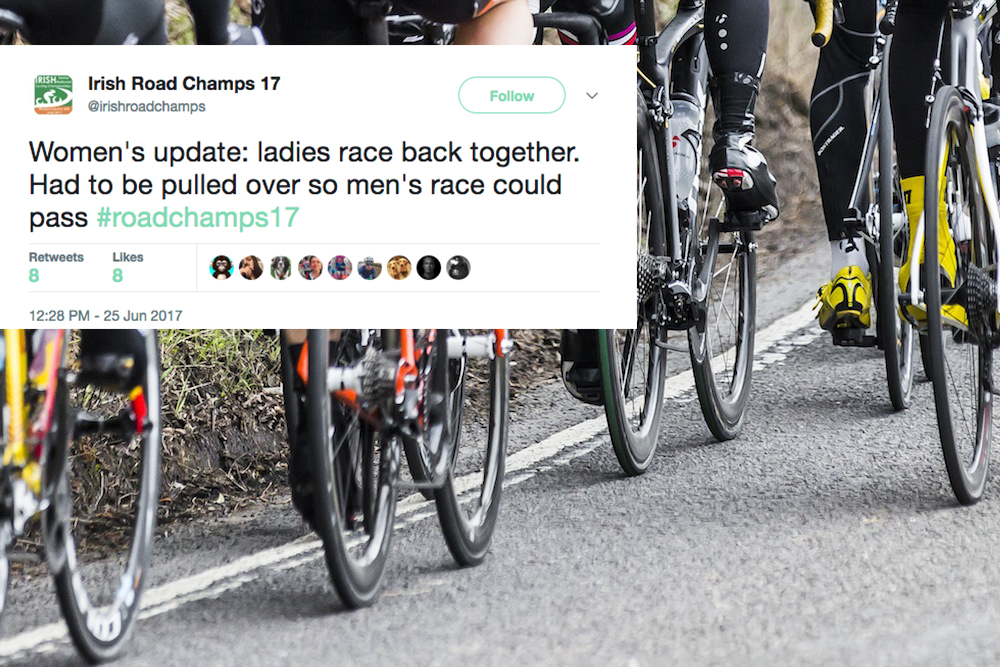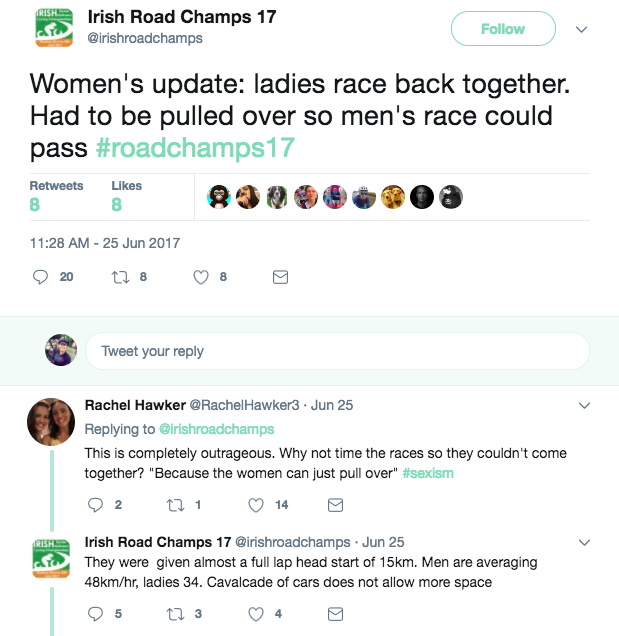Irish National Champs organisers criticised for having to pull over women's peloton for men's race to pass
Decision to neutralise women's race on the final lap didn't go down well


The organisers of the Irish National road race attracted criticism over the weekend when the structure of the day's racing meant the women's peloton was forced to pull over for the men's race.
The Irish National Championships, held in Wexford, were won by defending champion Lydia Boylan (Team WNT) and Ryan Mullen (Cannondale-Drapac) respectively.
>>> Nine things we learned from the British National Championships
Boylan took the win solo, springing from the group with 5km to go on the final climb of Codd's Lane and retaining her lead to the finish to take her third National title. In the past two editions, she's won from a sprint. Mullen also broke clear at 4km on the way to his win.
The overtake took place during the final lap for the women - and the neutralised section ended with 10km to the finish line. Commenting on the organisation, Boylan said: "It was the right call on the day but a scenario that definitely needs to be avoided in future National Championships’."
Organisers tweeted to explain the situation, after the commissaire made the call, and were greeted with disgruntlement.

Justifying the decision, they quoted the average speeds of both the men and women’s events, saying: “They were given almost a full lap (15km) head start. Average speed of men is 48km/hr. Woman's 34km/hr."
Get The Leadout Newsletter
The latest race content, interviews, features, reviews and expert buying guides, direct to your inbox!
The women were given a 15km head start on the men's race - a full lap being 18.9km long, the idea being that a gap would be maintained until the finish line.
In the Cycling Ireland race report, it was commented: "The Elite Women’s race was first to leave the HQ at 10AM. The race was fought quite conservatively with a good pace set and a few riders getting dropped every lap... The Elite men’s race was aggressively fought with attacks from the start through to the end."
Every race has its own character and in this case it seems the average speed of the races was miscalculated; with not enough room left for error.
The race in Ireland was directly compared the the British National races, where the women's event started at 9am, and the men's race commenced at 1.45pm - when the women had finished their event.
Pulling a slower race over to allow a faster race to overtake is common in amateur racing – but at a National level, many viewers felt it was unacceptable.

Thank you for reading 20 articles this month* Join now for unlimited access
Enjoy your first month for just £1 / $1 / €1
*Read 5 free articles per month without a subscription

Join now for unlimited access
Try first month for just £1 / $1 / €1
Michelle Arthurs-Brennan the Editor of Cycling Weekly website. An NCTJ qualified traditional journalist by trade, Michelle began her career working for local newspapers. She's worked within the cycling industry since 2012, and joined the Cycling Weekly team in 2017, having previously been Editor at Total Women's Cycling. Prior to welcoming her first daughter in 2022, Michelle raced on the road, track, and in time trials, and still rides as much as she can - albeit a fair proportion indoors, for now.
Michelle is on maternity leave from April 2025 until spring 2026.
-
 'It took everything' - Puck Pieterse outclimbs Demi Vollering to win La Flèche Wallonne
'It took everything' - Puck Pieterse outclimbs Demi Vollering to win La Flèche WallonneDutch 22-year-old shows Classics pedigree with first one-day victory
By Tom Davidson
-
 Tadej Pogačar flies to dominant victory at La Flèche Wallonne
Tadej Pogačar flies to dominant victory at La Flèche WallonneSlovenian takes second win at Belgian classic ahead of Kévin Vauquelin and Tom Pidcock
By Tom Thewlis